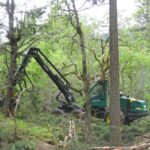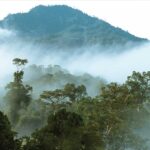Fellows at the World Forestry Institute debut forest-preserving projects with global reverberations.
When Richard Banda applied to the World Forestry Institute’s International Fellowship program, he wanted to learn about the most efficient ways to prune trees native to Malawi. A forestry officer, Banda’s company is part of a reforestation project in Viphya Plantations, the largest forestry plantation in Malawi.
“Malawi had one of the largest forest plantations in Africa, but once it was harvested, it was never replanted,” he says. “With 98% of people relying on fuel wood for cooking, pressure to harvest the country’s natural forests has increased.”
Banda applied to the program wanting to learn the best and most efficient pruning techniques.
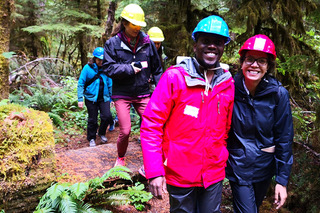
Credit: Shadia Duery
But after Banda gained access to the program’s resources, the scope of his project became more ambitious. “My project during the fellowship is understanding how to craft a strong project proposal to make investing in reforestation in Malawi appealing to international investors,” Banda says.
The World Forestry Institute, based in Portland, offers professional development and continuing education programs for foresters and other natural resource professionals. It has gained a reputation as a center of excellence for forestry practices. As issues of climate change and global deforestation take root in places such as the Amazon rainforest, the institute’s work is set to gain increasing global importance.
After meeting with natural resource management leaders in the Pacific Northwest, Banda now believes the best solution to deforestation isn’t just efficient pruning, but selling the idea that forests are more lucrative, long-term investments if they are left standing.
“The ultimate goal is to empower the surrounding communities economically by creating jobs and reducing the pressure on natural forest,“ he says.
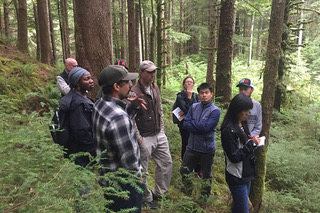
Credit: Shadia Duery
Next month, fellows from China, Brazil, and other countries around the world will debut their research projects after six fast-paced months of research and design. The program invites eight international forestry professionals to design resource management projects in the Pacific Northwest, with the intention of putting similar projects into action when they return home
The fellows also get the opportunity to meet the institute’s partner organizations, including the Oregon Forest Resources Institute, L&C Carbon and the Nonprofit Association of Oregon.
“The fellows come to the Pacific Northwest because we have one of the most productive forestry [practices] in the world,” says Shadia Duery, program manager of the World Forestry Institute‘s International Fellowship. “We provide a platform for exchange. We provide a platform for people all over the world to come together about natural resource management.”
All projects are aimed at creating solutions and best practices to address a range of forestry challenges, and all are applicable to issues facing the Northwest. Fellows attended guided tours, speeches, conferences and symposiums while developing their own projects.
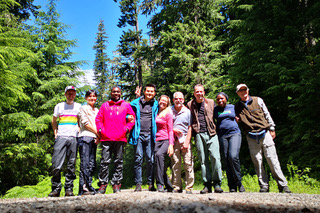
Credit: Shadia Duery
The projects are about implementing policy, organizational tools and business-forward solutions to sustainable natural resource management. The fellows meet nonprofit groups to learn how to organize, as well as groups that monetize natural resources and generate investment in forests.
Romain Matile comes from the south of France, where the region, like Oregon, faces a higher rate of large forest fires than ever before. “I am looking to better understand how to gain social license to implement controlled burning as a forest fire prevention tool,” Matile says.
His project aims to curb wildfires in Oregon, with the aim of learning how to apply these techniques in France.
Other projects attempt to secure international partnerships to protect natural resources. For the past six years Ana Kanoppa has been working in Brazil’s Amazon basin to implement a project called REDD+, a UN-backed carbon reduction program which seeks to mitigate climate change through reforestation.
Now she’s focusing on generating a more consistent stream of funding. “Forest conservation is expensive and requires long-term funding to achieve sustainable results,” she says. “During my fellowship, I am seeking new economic tools to mobilize funding for forest conservation from international public and private sources.”
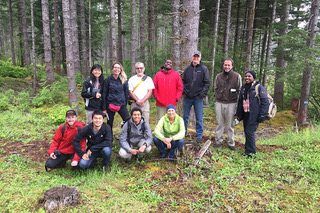
Credit: Shadia Duery
At the heart of all of these projects is community and environmental impact. By drawing on the institute’s range of partners, projects designed by the fellows could have large impact both globally and in Oregon’s neck of the woods.
For Duery, every graduate of the fellowship increases the institute’s global network.





